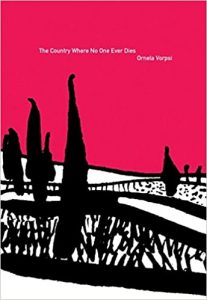Reviewed by Claire Pickens

With her first novel, The Country Where No One Ever Dies, Ornela Vorpsi emerges as a writer with sharp-edged, ironic wit and pithy delivery. From the earliest pages of this novel—if one can call it that without disservice to the succinct vignettes it contains—the country of Albania in its Communist government goes under strict critique by the narrator, a girl with no fixed state of identity. She has only one solid consistency: her voice. Her age, name, village, and situation all change from chapter to chapter, yet Vorpsi somehow captures the landscape of Albania’s citizens under the siege of a totalitarian government with only her voice. Their grand Party claim they will be “the envy of the entire world.” A world in which young girls train for an invasion because they are quickly advancing to Communism, which means that “Mankind will have reached such an advanced stage of development that we will all be able to go shopping without any money!”
Vorpsi focuses on the mundane that makes living in Albania during these times unique. “Albania is a country where no one ever dies… our bodies are so strong that nothing can destroy them.” Even the narrator admits to this, being “filled with the sense of eternity that infects my country.” This novel touches on sex and beauty, life and death, the so-called utopian state, and how they all inform each other in a country where, despite its claims, societal roles are a pressing weight on a woman’s back. Albanians, especially women, have only one obsession “dearer to them than death… the quintessence of their existence… Fornication.” This is a book where every character is obsessed with the idea of virginity—“The Albanian chorus laments: ‘The beautiful virgin! Who knows how many times she’s had herself stitched and unstitched?’—where women are their own toughest critics. If a young woman pervades beauty—even at an innocent age—she is a whore. If she is ugly, she is not a whore. Yet she still possesses no value. The narrator, most frequently a girl who lives with her beautiful (which is to mean whorish) mother while her father has been imprisoned for political reasons, is one that possesses beauty, and encounters many older men that assume she is destined to act immorally and have no problem helping her get there.
One major detail that has yet to be mentioned is that Ornela Vorpsi is Albanian herself and lived there during these Communist times. It would perhaps not be a stretch to call this novel somewhat autobiographical, as the narrator is sometimes referred to as “Ornela” among her many identities. This novel does not fit into a traditional form as it is made up of short pieces that come from the view of young women living in Communist Albania, and they all encapsulate grim, significant details that can only be seen as memories, told from experience. It seems it would also not be a stretch to consider this a brutal letter to Albania from a former citizen. The scenes she puts into this novel are painful for the reader and damaging for the character, and the narrator is so deeply disturbed by them that this seems to become Vorpsi’s cathartic cleansing of the damage this controlling government did to her as a young girl. Political oppression was obviously a burden on the lives of women in this Albania. However, it seems that the character’s disinterest in communicating and their blatant and ugly pettiness also contribute to the country’s pervasive misery. Despite this, Vorpsi manages to keep a level of humorous irony in her writing; nevertheless, a few moments of melancholy are able to make their way in. One chapter talks only of a lake where unmarried, pregnant women go to commit suicide (as abortion was illegal). Not only does that bring about a deep sadness for the reader, but Vorpsi goes further and dedicates the chapter to two people: “A and L.” Knowing that the author personally knew people who went to this lake, or at least had the story recounted to her by someone else, lays a thick layer of morbid realization of how oppressed women were by this society. My heart ached for the women that were too scared or ashamed to face the harassment her and her child would have to endure if she raised what represented her indecent actions.
The Country Where No One Ever Dies produces a dichotomy of feelings for the reader, telling a story of a people deeply in love yet deeply at odds with their country’s state. Vorpsi concludes this novel with an especially ironic epilogue: “The Promised Land” (a euphemism for Italy). Even with their hatred for their current lives, nowhere else feels quite right; nowhere else can feel like home. They cannot leave Albania and feel as if they have done the right thing. Italy is where “Albanians discover that they’re mortal… they all go back to Albania. They don’t want to hear another word about the Promised Land. The Promised Land taught them they were mortal. And they never want to die.”
